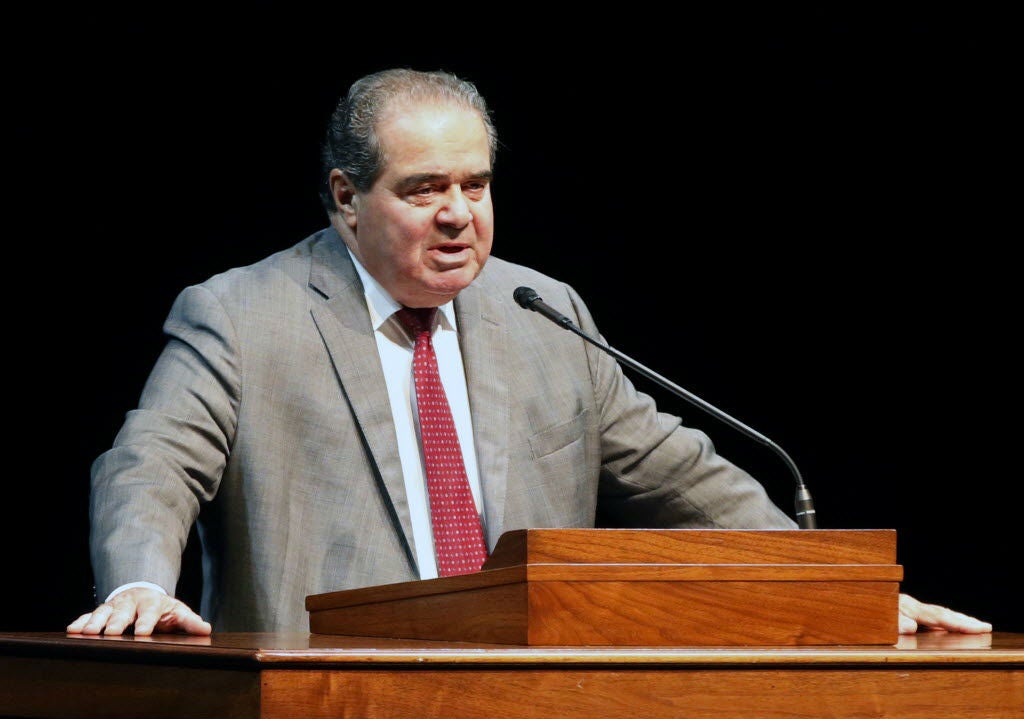10 of Antonin Scalia's most bizarre and controversial quotes
'The opinion is couched in a style that is as pretentious as its content is egotistic'

Antonin Scalia was certainly one of the most outspoken Supreme Court justices in American history. He always had something to say, and his angry, sometimes-furious, and often-sarcastic dissents produced some of the most memorable quotes of any Supreme Court decisions.
Scalia's penchant for the colorful was evident throughout his tenure on the court. Below are 10 of his most memorable, quirky, scathing and pithy quotes.
June 2015, King v. Burwell (The decision that decided the fate of the Affordable Care Act):
“We should start calling this law SCOTUScare.” (In reference to the court having upheld the law for the second time, over his objections.)
“This case requires us to decide whether someone who buys insurance on an Exchange established by the Secretary gets tax credits. You would think the answer would be obvious — so obvious there would hardly be a need for the Supreme Court to hear a case about it.”
“The Court’s next bit of interpretive jiggery-pokery involves other parts of the Act that purportedly presuppose the availability of tax credits on both federal and state Exchanges.”
June 2015, Obergefell v. Hodges (The decision that legalized same-sex marriage nationwide):
“When the Fourteenth Amendment was ratified in 1868, every State limited marriage to one man and one woman, and no one doubted the constitutionality of doing so. … Since there is no doubt whatever that the People never decided to prohibit the limitation of marriage to opposite-sex couples, the public debate over same-sex marriage must be allowed to continue. But the Court ends this debate, in an opinion lacking even a thin veneer of law.”
“The opinion is couched in a style that is as pretentious as its content is egotistic. It is one thing for separate concurring or dissenting opinions to contain extravagances, even silly extravagances, of thought and expression; it is something else for the official opinion of the Court to do so.”
March 2012, on the Affordable Care Act:
"Could you define the market -- everybody has to buy food sooner or later, so you define the market as food, therefore, everybody is in the market; therefore, you can make people buy broccoli."
January 2012, Citizens United v. FEC (opening the door to increased outside spending in elections):
"I don't care who is doing the speech — the more the merrier. People are not stupid. If they don't like it, they'll shut it off."
May 2011, California Lawyer magazine interview:
"Certainly the Constitution does not require discrimination on the basis of sex. The only issue is whether it prohibits it. It doesn't. Nobody ever thought that that's what it meant. Nobody ever voted for that. If the current society wants to outlaw discrimination by sex, hey we have things called legislatures, and they enact things called laws. You don't need a constitution to keep things up-to-date. All you need is a legislature and a ballot box. You don't like the death penalty anymore, that's fine. You want a right to abortion? There's nothing in the Constitution about that. But that doesn't mean you cannot prohibit it. Persuade your fellow citizens it's a good idea and pass a law. That's what democracy is all about. It's not about nine superannuated judges who have been there too long, imposing these demands on society."
May 2001, PGA Tour Inc. v. Martin (on whether a handicapped golfer could use a motorized cart):
"If one assumes, however, that the PGA TOUR has some legal obligation to play classic, Platonic golf — and if one assumes the correctness of all the other wrong turns the Court has made to get to this point — then we Justices must confront what is indeed an awesome responsibility. It has been rendered the solemn duty of the Supreme Court of the United States, laid upon it by Congress in pursuance of the Federal Government’s power “[t]o regulate Commerce with foreign Nations, and among the several States,” to decide What Is Golf. I am sure that the Framers of the Constitution, aware of the 1457 edict of King James II of Scotland prohibiting golf because it interfered with the practice of archery, fully expected that sooner or later the paths of golf and government, the law and the links, would once again cross, and that the judges of this august Court would some day have to wrestle with that age-old jurisprudential question, for which their years of study in the law have so well prepared them: Is someone riding around a golf course from shot to shot really a golfer? The answer, we learn, is yes. The Court ultimately concludes, and it will henceforth be the Law of the Land, that walking is not a “fundamental” aspect of golf."
June 1996, United States v. Virginia:
"If it were impossible for individual human beings (or groups of human beings) to act autonomously in effective pursuit of a common goal, the game of soccer would not exist."
Copyright: The Washington Post
Join our commenting forum
Join thought-provoking conversations, follow other Independent readers and see their replies
Comments